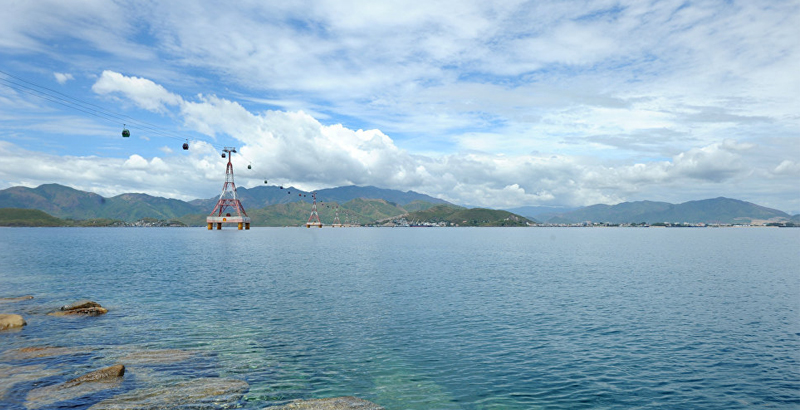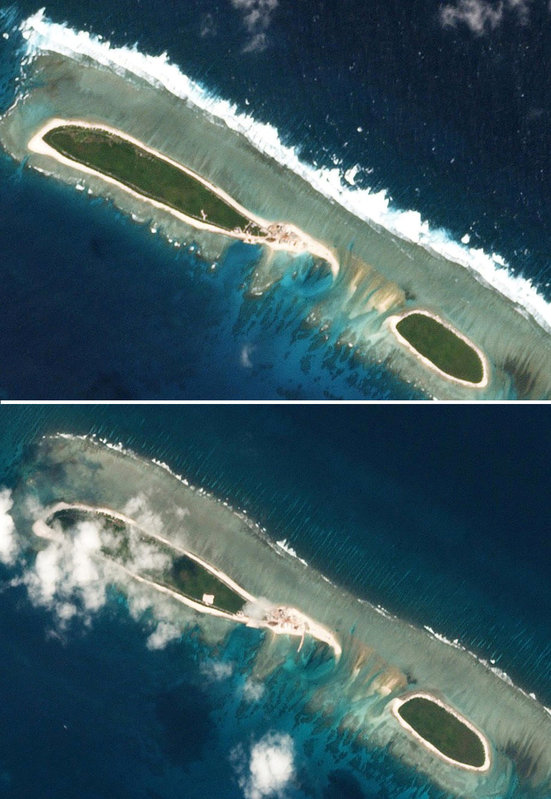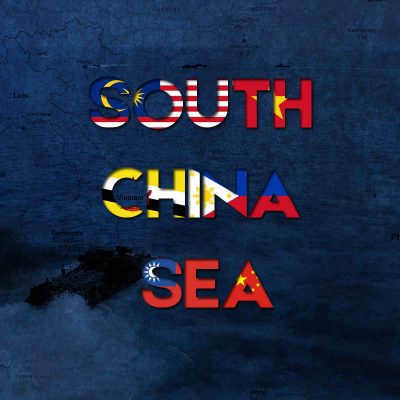Beijing has started fresh construction work in the disputed South China Sea.

The South China Sea (Photo: RIA Novosti / Oksana Mamlina)
China continues to strengthen its military reach in the disputed South China Sea, starting fresh construction work in the area, the Reuters news agency reported, citing new satellite images.
According to the news agency, the images, taken from space, indicate that the authorities of the People’s Republic of China have started construction work on the disputed Paracel Islands in the South China Sea.
The photos, taken by satellites of the Planet Labs private firm on March 6, allow seeing workers, clearing the territory and presumably preparing for usage a harbor on the North Island, which is part of the Seven Sisters group of islands. The works were interrupted last year due to a typhoon. As Reuters noted, in January, construction work was spotted on other islands of the archipelago.
According to a mainland security expert at the Hong Kong’s Lingnan University, Zhang Baohui, facilities on the Paracel Islands will allow Beijing to strengthen its position in the South China Sea and secure the country’s positions in the most strategically important Spratly archipelago.
A representative of the Chinese Defense Ministry told Reuters that he does not know about any works on the islands.
A news agency’s source in Washington did not confirm the reports on construction on the disputed islands, but noted that such works are consistent with China’s policies in the region.
China and a number of countries in the region, including Japan, Vietnam and the Philippines, have disagreements on maritime boundaries and zones of responsibility in the South China and East China Seas. China believes that the Philippines and Vietnam consciously use support of the US to escalate tensions in the region.

Combination of satellite photos shows the Chinese-controlled North Island, part of the Paracel Islands group in the South China Sea, on February 15, 2017 (top) and on March 6, 2017 (Photo: Planet Labs / Handout via Reuters)





The time honored tradition of colonize and claim. These are uninhabited islands / atolls. I have no idea why we are getting so bent out of shape over this.
I read National Review comparing this to Japan in the 1930/40’s, seriously? You are going to compare this to conquering and enslaving millions of unwilling subjects. Yes, everything is WW2 all over again unless we have our carriers in their face. Someday soon we may be forced to remember WW1 where no one backed down.
Nice big targets those carriers.
It seems to be more about off shore resources ( oil etc ) , although China will not be denied a defensive position at sea . The Caribbean is America’s naval backyard , The Black Sea is Russia’s , The South China Sea is China’s , they are not going to be humiliated again .
State Dept Chief of Spatial and Boundary Analysis, Daniel Dzurek recounting how Japan returned the South China Sea to China after WWII in treaties that adhered to Japan’s surrender agreement: “Because the Allies, in particular the United Kingdom and the United States, could not agree on which government represented China, no Chinese delegation participated in the 1951 San Francisco Peace Conference. Therefore the Republic of China (Taiwan) negotiated a separate peace treaty with Japan, signed on 28 April 1952. Article 2 of the text included a reference to the San Francisco treaty:
“It is recognized that under Article 2 of the Treaty of Peace with Japan signed in the city of San Francisco in the United States of American on September 8 1951, Japan has renounced all right, title and claim to Taiwan (Formosa) and Penghu (the Pescadores) as well as the Spratly Islands and Paracel Islands””
Republic of China has argued that the explicit reference to the Spratly and Paracel islands in the text of this bilateral treaty implies Japanese recognition of Chinese sovereignty. Samuels and Lu have observed that, unlike the 1951 treaty, the Sino-Japanese text mentions the Spratly and Paracel islands in the same sentence as Taiwan and the Pescadores islands. The latter are generally recognized as Chinese territories. Moreover, according to the negotiating record Japan insisted that the renunciation article deal only with Chinese territory. This shows that the ROC and Japan viewed the islands of Taiwan, the Pescadores, the Spratlys, and tha Paracels as having a similar status – that is, belonging to China”. https://books.google.co.th/books?id=o5P4U4UlucMC&pg=PA15&lpg=PA15&dq=Daniel+Dzurek+“Because+the+Allies,+in+particular+the+United+Kingdom+and+the+United+States,+could+not+agree&source=bl&ots=46YA_EwQss&sig=pBcNObrlzocctryY0wJeZFuDtn0&hl=en&sa=X&ved=0ahUKEwjc6abSvqDPAhUHs48KHXImDvUQ6AEIIjAB#v=onepage&q=Daniel%20Dzurek%20“Because%20the%20Allies%2C%20in%20particular%20the%20United%20Kingdom%20and%20the%20United%20States%2C%20could%20not%20agree&f=false